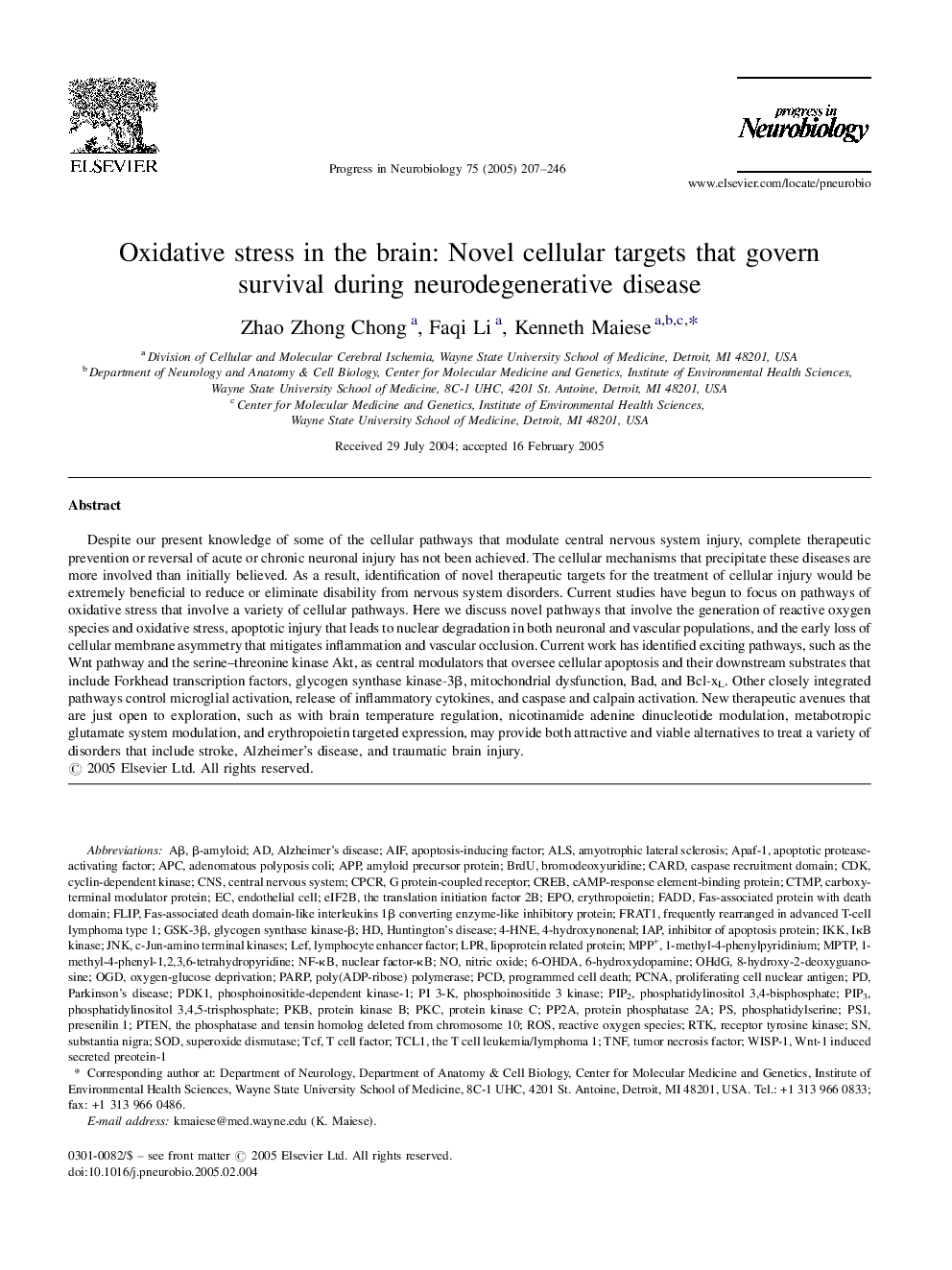| Article ID | Journal | Published Year | Pages | File Type |
|---|---|---|---|---|
| 9435185 | Progress in Neurobiology | 2005 | 40 Pages |
Abstract
Despite our present knowledge of some of the cellular pathways that modulate central nervous system injury, complete therapeutic prevention or reversal of acute or chronic neuronal injury has not been achieved. The cellular mechanisms that precipitate these diseases are more involved than initially believed. As a result, identification of novel therapeutic targets for the treatment of cellular injury would be extremely beneficial to reduce or eliminate disability from nervous system disorders. Current studies have begun to focus on pathways of oxidative stress that involve a variety of cellular pathways. Here we discuss novel pathways that involve the generation of reactive oxygen species and oxidative stress, apoptotic injury that leads to nuclear degradation in both neuronal and vascular populations, and the early loss of cellular membrane asymmetry that mitigates inflammation and vascular occlusion. Current work has identified exciting pathways, such as the Wnt pathway and the serine-threonine kinase Akt, as central modulators that oversee cellular apoptosis and their downstream substrates that include Forkhead transcription factors, glycogen synthase kinase-3β, mitochondrial dysfunction, Bad, and Bcl-xL. Other closely integrated pathways control microglial activation, release of inflammatory cytokines, and caspase and calpain activation. New therapeutic avenues that are just open to exploration, such as with brain temperature regulation, nicotinamide adenine dinucleotide modulation, metabotropic glutamate system modulation, and erythropoietin targeted expression, may provide both attractive and viable alternatives to treat a variety of disorders that include stroke, Alzheimer's disease, and traumatic brain injury.
Keywords
FLIPEPOTCL1PIP2PP2ARTKTCFAPCAPPPDK1GSK-3βMPTPOGDPIP3PS1PCDCREBPKBPARP1-methyl-4-phenylpyridiniumPKCIAPAPAf-1IKKFADD6-HydroxydopamineTNFPI 3-KJnk4-HNE4-hydroxynonenalPCNALPRCTMPeIF2Bapoptotic protease-activating factor6-OHDAcPCRCDKNF-κBlymphocyte enhancer factorWisp-1Aβ1-methyl-4-phenyl-1,2,3,6-tetrahydropyridine8-Hydroxy-2-deoxyguanosineIκB kinaseMPP+presenilin 1ROSβ-Amyloidadenomatous polyposis coliProliferating Cell Nuclear AntigenAIFerythropoietinamyotrophic lateral sclerosisBrdUbromodeoxyuridineAlzheimer's diseaseALSHuntington's diseaseParkinson's diseasesubstantia nigracaspase recruitment domainCNSSODEndothelial cellSuperoxide dismutasecentral nervous systemapoptosis-inducing factorT cell factortumor necrosis factornuclear factor-κBPhosphatidylserinephosphatidylinositol 3,4-bisphosphatephosphatidylinositol 3,4,5-trisphosphatephosphoinositide 3 kinaseLefOxygen-glucose deprivationProgrammed cell deathinhibitor of apoptosis proteinNitric oxidePhosphoinositide-dependent kinase-1protein phosphatase 2AcAMP-response element-binding proteinFas-associated protein with death domainamyloid precursor proteinprotein kinase BProtein kinase CPoly(ADP-ribose) polymerasePtenCARDcyclin-dependent kinaseReactive oxygen speciesReceptor Tyrosine KinaseG protein-coupled receptor
Related Topics
Life Sciences
Neuroscience
Neuroscience (General)
Authors
Zhao Zhong Chong, Faqi Li, Kenneth Maiese,
